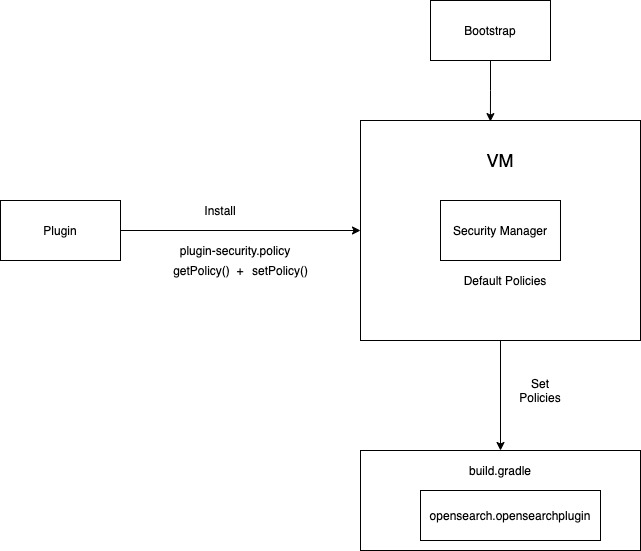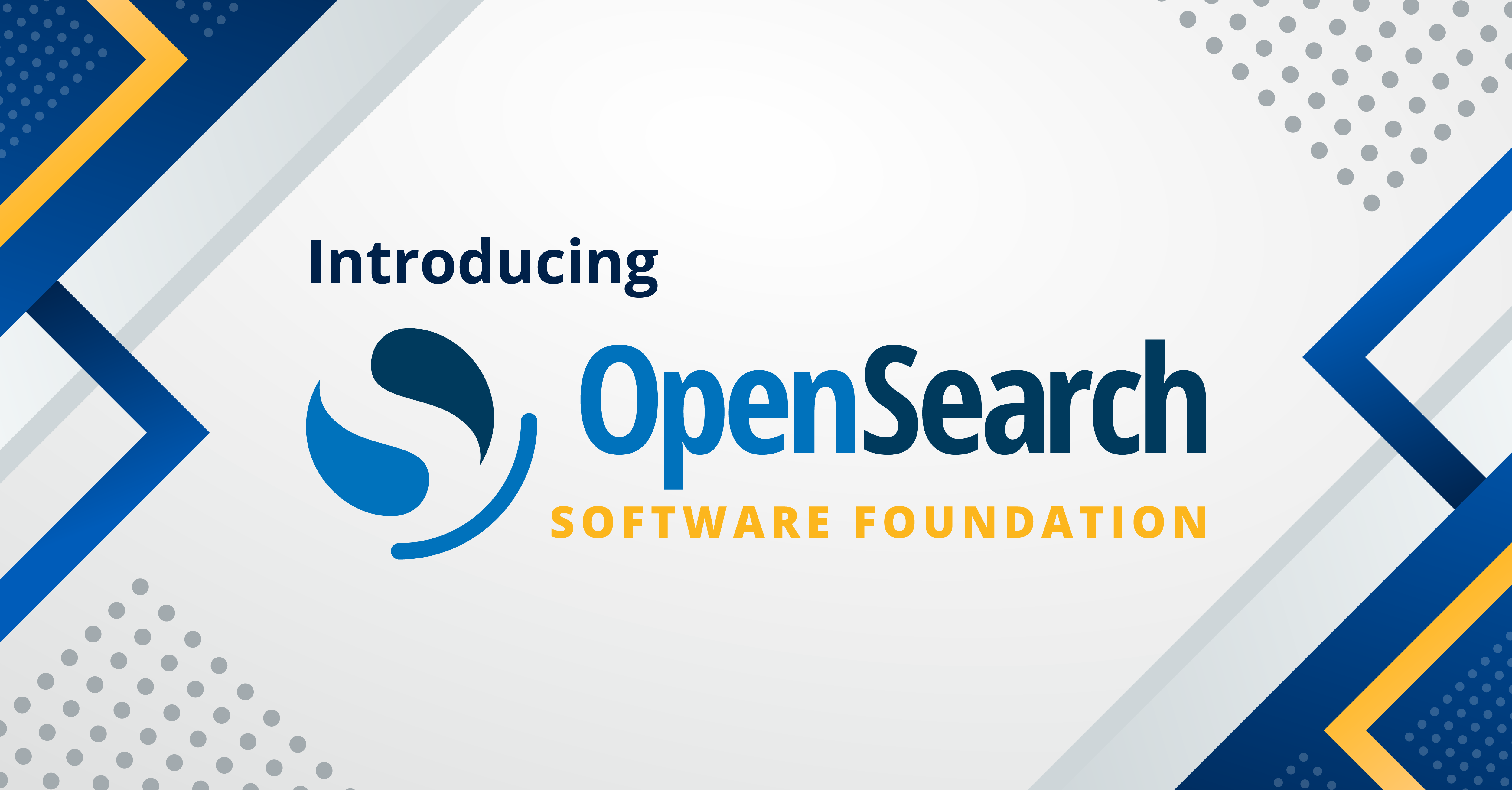Introduction to OpenSearch Plugins
OpenSearch enables enhancing core features in a custom way via plugins. For example, plugins could add custom mapping types, engine scripts, etc. In this blog post we wanted to unbox how plugins load, install, and run in OpenSearch.
Pluggable Architecture
The modular architecture in OpenSearch makes it easier to develop on a large codebase (4.5MM lines). The blog post from OpenSearch partner Logz.io describes why pluggable architecture is important and how plugins can be developed.
The Plugin architecture is designed to enable solving specific problems and extending generic features. For example, Anomaly Detection reads time stream data ingested and finds anomalies. Another example is Job Scheduler plugin which schedules and runs generic jobs.
Plugins are of various types, generally categorized as:
- Analysis: Used for researching of data available within the cluster,
- Discovery: Used for easy recognition of nodes in various platforms,
- Ingest: Used for pre/post-processing data during ingestion,
- Mappers: Helps extend/create data fields,
- Snapshot/Restore: Used to create a snapshot and restore data.
To develop these plugins, the codebase has well defined interfaces to solve specific sub-set of problems.
Extension Points
The architecture is designed for plugins to hook onto various points within the OpenSearch codebase. Plugins can subscribe to relevant notifications/events via these extension points.
The Plugin.java file defines a list default extension points.
Extension points enable plugins to hook into various events within the cluster and data lifecycles in OpenSearch. The default extension points are defined by Plugin.java abstract class:
getFeature- Implement a custom feature and respond to cluster state API.createGuiceModules- Implement node level dependency injection modules via Guice.getGuiceServiceClasses- Node level services which will be automatically called with node state changes.createComponents- Custom component implemented and its lifecycle being managed by OpenSearch.additionalSettings- Implement additional node level settings.getNamedWriteables- Custom parsers the plugin would use for transport messaging.getNamedXContent- Custom parsers the plugin would use for NamedObjects.onIndexModule- Index level extension point, called before an index is created.getSettings- Implement additional cluster level settings.getSettingsFilter- Implement additional cluster level settings filter.getSettingUpgraders- Implement setting upgraders.getIndexTemplateMetadataUpgrader- An extension to modify index template metadata on startup.getExecutorBuilders- Implement custom thread pools for executions.getBootstrapChecks- Add additional bootstrap checks when OpenSearch node initializes.getRoles- Implement additional DiscoveryNodeRole’s.getAdditionalIndexSettingProviders- Implement additional index level settings for newly created indices.
Custom plugin interfaces can define new extension points for plugins to hook onto. For example, the Engine Plugin interface can be used to provide additional implementations to the core engine, expose a hook to node bootstrap to load the custom engineFactory and the Index Service overrides it if plugin chooses to override.
How do plugins work?
As you might have used plugins in the OpenSearch distribution. Plugins are installed and loaded when OpenSearch starts.
Installing a plugin
The OpenSearch distribution comes with a tool ./bin/opensearch-plugin which installs a plugin. PluginCli reads and validates plugin-descriptor.properties file packaged with every plugin. For example, the OpenSearch security plugin defines the plugin-descriptor.properties file which defines a bunch of parameters, and the tool verifies if it is using the compatible version of OpenSearch, and the dependencies are present.
The tool verifies the plugin-security.policy file, defined by the plugin which needs additional security permissions. For example, the OpenSearch security plugin defines many permissions like file read/write, classloading or networking that it needs through the plugin-security.policy file. These permissions are managed via Java Security Manager (more details later in this post). After the tool validates the plugin, it copies all jars into the plugins directory. By default, the OpenSearch Minimum distribution does not package any plugins including the native plugins which exist in the OpenSearch codebase.
Loading a plugin
Plugins run within the same process as OpenSearch. As the OpenSearch process bootstraps, it initializes PluginService via Node.java. All plugins are class-loaded via loadPlugin during the bootstrapped of PluginService.
It checks the plugins directory and loads the classpath where all the plugin jars and their dependencies are already installed by the opensearch-plugin install tool.
~/opensearch-1.1.0/plugins$ ls
opensearch-alerting opensearch-asynchronous-search opensearch-index-management opensearch-knn opensearch-performance-analyzer opensearch-security
opensearch-anomaly-detection opensearch-cross-cluster-replication opensearch-job-scheduler opensearch-notebooks opensearch-reports-scheduler opensearch-sql
As the plugins are class-loaded during the node bootstrap, the extension points (defined by the plugin interface) initialize the data structures. This design of loading plugins during the node bootstrap prevents them being loaded on the fly and cannot be hot-swapped. Each node within the cluster has to be restarted to reload a new plugin.
Plugins vs Modules
As you might have noticed, OpenSearch defines plugins and modules differently. The main difference is modules are automatically loaded in an OpenSearch node and are packaged with opensearch-min artifact. On the flipside, plugins are not automatically packaged and have to be manually installed.
~/opensearch-1.1.0/modules$ ls
aggs-matrix-stats geo ingest-geoip lang-expression lang-painless opensearch-dashboards percolator reindex transport-netty4
analysis-common ingest-common ingest-user-agent lang-mustache mapper-extras parent-join rank-eval repository-url
Modules essentially are plugins and they implement plugin interfaces, but the only logical difference is that they are loaded by default which makes them special. All core extendible features are built via modules for extensibility.
Java Security Manager
Java applications are prone to have vulnerabilities on a remote cluster or by a DDoS attack. To prevent this, JVM can be run in a sandbox mode which will prevent, for example: access to the local hard disk or the network. All of these are handled by the Security Manager.
How Security Manager is used in OpenSearch?
- As OpenSearch bundles a few plugins, every plugin can define its own custom security policy file which will be installed at the same time when OpenSearch is installing the plugin.
- Security Manager is initialized in Opensearch.java, and the plugins that require security polices have a custom policy file called plugin-security.policy.
- The getPolicy() method will take care of assigning the initial default policies required for the plugins and setPolicy() method will assign the custom policies of the plugins present in
plugin-security.policy. - Each custom security policy file is signed and has a codebase which is a signed key between OpenSearch and the plugin.
- Each security policy can be attached via gradle plugin opensearch.opensearchplugin in the
build.gradlefile of the plugin.
opensearchplugin {
description 'The HDFS repository plugin adds support for Hadoop Distributed File-System (HDFS) repositories.'
classname 'org.opensearch.repositories.hdfs.HdfsPlugin'
}

The security policy has a notion of per-user policies and it is useful in the context of manually configuring the application deployment on a single specific computer, but it is hard to use in the generic case.
Benefits of Security Manager in OpenSearch
- Prevent access to OpenSearch cluster with all permissions. Any intruder can add new classes, change private members or access the ClassLoaders. The Security Manager takes care of it by creating a sandbox environment.
exitVMpermission is allowed for a few special classes, for other classes the process will kill and exit the cluster. This method calls checkPermission with the RuntimePermission and throws a SecurityException.- Security Manager Policy allows installing a plugin through
plugin-security.policywhich consists of dynamic configuration and dependencies required for a plugin to run. - Plugins can ask for
AllPermissionof the OpenSearch cluster. The Security Manager takes care ofAllPermissionand makes sure to check it as a part of Bootstrap. - Plugins can create a
plugin-security.policyfile and write dynamic configuration and permissions required to run from the OpenSearch Cluster.
Closing Notes
We hope this post helped explain how plugins work within OpenSearch. We would love to see you get your hands dirty, and develop a new plugin for OpenSearch. Looking forward, we are thinking about solving the limitations in plugin architecture and would ask for your feedback in OpenSearch#1422.
In the coming days, look out for a follow-up post soon on intro to plugins with OpenSearch Dashboards.




